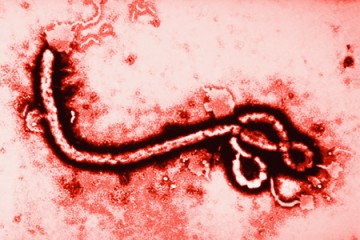The World Health Organization recently reported that there have been nearly 9,000 cases and 5,000 deaths from Ebola virus in seven countries. The outbreak—centered in the West African nations of Liberia, Sierra Leone, and Guinea—has rapidly become a public health crisis, with the CDC estimating that 1.4 million could become infected in Liberia and Sierra Leone by January.
On Oct. 7, the first patient diagnosed with Ebola virus outside of Africa, Thomas Eric Duncan, died at a hospital in Dallas, Texas. Duncan, 42, contracted Ebola in Liberia before traveling to Dallas, where he was admitted to Texas Health Presbyterian Hospital on Sept. 28. Two nurses who cared for him were subsequently diagnosed with Ebola.
As members of the Johns Hopkins community respond to the outbreak, Johns Hopkins Medicine has gathered answers to frequently asked questions about the Ebola virus and Johns Hopkins preparations at hopkinsmedicine.org. Answers to five of the most common questions are listed below.
What is Ebola and what are its symptoms?
Ebola virus is the cause of a viral hemorrhagic fever disease. Symptoms of Ebola include fever, severe headache, muscle pain, vomiting, diarrhea, stomach pain, and unexplained bleeding or bruising.
What is Johns Hopkins doing to ensure its patients and visitors are protected?
Our staff receives regular training and frequently practices to ensure that our hospitals are prepared for all scenarios. If a patient is suspected to have Ebola virus, he or she will be placed in isolation, staff members will take enhanced precautions, and the patient will be evaluated by our specialists in coordination with the Maryland Department of Health and Mental Hygiene.
How do doctors, nurses, and other health care workers stay protected from contracting the Ebola virus?
Johns Hopkins Medicine's health care workers will wear special protective clothing and equipment, and they are being extensively trained in their proper use. Our infection control teams are training and educating our clinical staff on proper procedures. The training of our staff began months ago.
If I have the virus, how soon will I have symptoms?
Symptoms seem to appear anywhere from two to 21 days after exposure to the virus, but eight to 10 days is most common.
How contagious is Ebola?
We believe that people only become infectious once they start to have symptoms. The risk of being infectious in the early course of the disease is generally low. The risk of infection is much higher in the later stages but can be effectively addressed with the proper use of appropriate personal protective equipment.
Posted in Health
Tagged infectious disease, ebola









